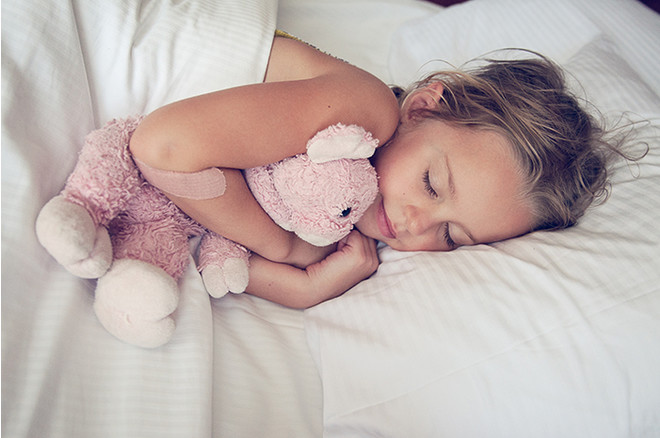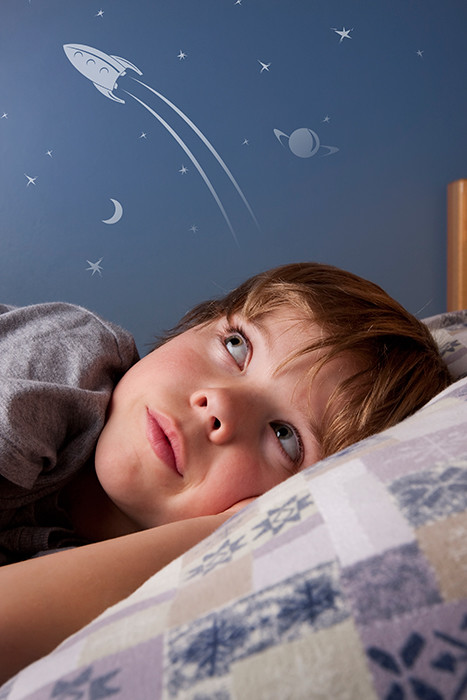 A photo: GettyWhen he is quite small. Sleeping in the same bed with a baby is very convenient for the newly-made mother, because it is easier to breastfeed, for example, it is easier to sleep yourself, mechanically continuing to stroke the baby’s back or head. For a baby to be so close to her mother - naturally, because for 9 months he listened to mother's breath, heartbeat, her soothing voice. And it is quite normal that the baby needs these sounds and sensations that are familiar to him. We will not remember the horror stories about when the mother crushed the child in a dream, these are exceptional cases. As a rule, the sleep of parents in the first months after the appearance of the baby is very sensitive. But the rule changes, if the mother before sleeping took sleeping pills or alcohol, dulling sensitivity. Many psychologists are categorical in judgments - it is necessary to teach the child to fall asleep in her bed as soon as possible, otherwise you will regret! Here it is. They threaten the fact that, each time clinging to the mother, the child does not learn to cope with the difficulties that have arisen. However, no need to tear up the root, everything happens gradually. The best way out is to put the crib close to the adult and remove the side. So the baby seems to be with her mother, and at the same time on her territory. The bed should be gradually moved further and further away, while watching the reaction of the child. It is assumed that one day the day will come when the constant presence of the mother is no longer required. It will be enough to kiss the baby's crown before going to bed and, perhaps, to sing a lullaby. When he is older than 3 years, as a rule, the child has a need for independence, sometimes this period comes earlier. And it's just great if one of the baby’s own decisions is to decide to sleep separately from the parents. Do not interfere! It is better to buy him a bed, even if he chooses it in the store himself, sew a new bed linen. At home, you can play the solemn relocation to a new "adult" bed. Hang pictures or posters depicting your favorite cartoon characters on the wall next to you. If the child is afraid of the dark, a night light will be a good helper if it is a normal or projecting image to the wall or ceiling. And the drawn curtains will create additional comfort and a sense of security from what is happening outside the window. If the fear is caused by “monsters living under the bed”, then a “magic” ritual will help, which will surely chase away all the monsters: a pinch of magic powder (powdered sugar, powder) sprayed over the bed, a magic elixir (water with diluted lavender essential oil, peppermint or vanilla), sprinkled around the bed. A good option is a bed, the walls of which from all sides reach to the floor. So the monsters have nowhere to hide. A child is comfortable next to his mother. But the feeling of comfort can be achieved in other ways. Favorite toy will become a reliable sleep guard, if you first tell your kid how excellent toys are able to do it. Live pets - a dog or a cat - also successfully perform this function, if you find a way to keep them within the children's bedroom for at least an hour. If the baby fell asleep, but in the middle of the night came back to the parent's bed, return him to his place. Just find out first why the child woke up - because of poor sleep, because he wanted to drink or to cope with natural needs. If something frightened him in the room, turn on the light, show that in fact it is the shadow of a chair or a large toy. Put him in a cot, calm him down, sit with him until he falls asleep. And so every time. Yes, it requires patience, but the baby will know that mother doesn’t care, mother will always understand and protect him.
A photo: GettyWhen he is quite small. Sleeping in the same bed with a baby is very convenient for the newly-made mother, because it is easier to breastfeed, for example, it is easier to sleep yourself, mechanically continuing to stroke the baby’s back or head. For a baby to be so close to her mother - naturally, because for 9 months he listened to mother's breath, heartbeat, her soothing voice. And it is quite normal that the baby needs these sounds and sensations that are familiar to him. We will not remember the horror stories about when the mother crushed the child in a dream, these are exceptional cases. As a rule, the sleep of parents in the first months after the appearance of the baby is very sensitive. But the rule changes, if the mother before sleeping took sleeping pills or alcohol, dulling sensitivity. Many psychologists are categorical in judgments - it is necessary to teach the child to fall asleep in her bed as soon as possible, otherwise you will regret! Here it is. They threaten the fact that, each time clinging to the mother, the child does not learn to cope with the difficulties that have arisen. However, no need to tear up the root, everything happens gradually. The best way out is to put the crib close to the adult and remove the side. So the baby seems to be with her mother, and at the same time on her territory. The bed should be gradually moved further and further away, while watching the reaction of the child. It is assumed that one day the day will come when the constant presence of the mother is no longer required. It will be enough to kiss the baby's crown before going to bed and, perhaps, to sing a lullaby. When he is older than 3 years, as a rule, the child has a need for independence, sometimes this period comes earlier. And it's just great if one of the baby’s own decisions is to decide to sleep separately from the parents. Do not interfere! It is better to buy him a bed, even if he chooses it in the store himself, sew a new bed linen. At home, you can play the solemn relocation to a new "adult" bed. Hang pictures or posters depicting your favorite cartoon characters on the wall next to you. If the child is afraid of the dark, a night light will be a good helper if it is a normal or projecting image to the wall or ceiling. And the drawn curtains will create additional comfort and a sense of security from what is happening outside the window. If the fear is caused by “monsters living under the bed”, then a “magic” ritual will help, which will surely chase away all the monsters: a pinch of magic powder (powdered sugar, powder) sprayed over the bed, a magic elixir (water with diluted lavender essential oil, peppermint or vanilla), sprinkled around the bed. A good option is a bed, the walls of which from all sides reach to the floor. So the monsters have nowhere to hide. A child is comfortable next to his mother. But the feeling of comfort can be achieved in other ways. Favorite toy will become a reliable sleep guard, if you first tell your kid how excellent toys are able to do it. Live pets - a dog or a cat - also successfully perform this function, if you find a way to keep them within the children's bedroom for at least an hour. If the baby fell asleep, but in the middle of the night came back to the parent's bed, return him to his place. Just find out first why the child woke up - because of poor sleep, because he wanted to drink or to cope with natural needs. If something frightened him in the room, turn on the light, show that in fact it is the shadow of a chair or a large toy. Put him in a cot, calm him down, sit with him until he falls asleep. And so every time. Yes, it requires patience, but the baby will know that mother doesn’t care, mother will always understand and protect him. A photo: GettyWhen he is completely grown up. The problem of falling asleep concerns not only babies, but also children over 7 years old, and sometimes adults. Psychologists agree that there is a snag in fears. Their reasons will help to identify a specialist. But at home you can also help your child dissociate himself from unwanted frightening factors.
A photo: GettyWhen he is completely grown up. The problem of falling asleep concerns not only babies, but also children over 7 years old, and sometimes adults. Psychologists agree that there is a snag in fears. Their reasons will help to identify a specialist. But at home you can also help your child dissociate himself from unwanted frightening factors.
- For example, do not hang a mirror in front of the bed. And the point is not in mysticism, but in the fact that any movement is reflected in the mirror, which can take on frightening forms in the dark.
- It is not recommended to paste over the walls of the nursery too dark wallpaper. When the light is off, the room will appear as one solid bottomless darkness.
- It is necessary to limit the large spaces of darkness - close the windows, the door to the corridor, especially if the bed is opposite it.
- Of course, no horror for the night. The violent fantasy of the impressionable child will see in each subject a terrible image from the film.
- Perhaps complete silence also brings discomfort when the child is left alone in the dark. Leave the TV on, but muffle the sound and set the timer to turn it off after a while.
 Photo:GettyWhat will help before bedThere are general recommendations when preparing for bed. I think all parents know them, but it will not be superfluous to remind. Routine. It is very important for children. Let it not be a soldier's drill, but adherence to some established rules. Believe me, everyone will be calmer this way: children - because it is easier for them to follow an established ritual than to quickly adapt to changes; parents - because it is easier to perform this children's ritual than to calm the hysteria of an offended child. It is better to put the child to bed at the same time, observing a certain order of actions. This relaxes the child, sets him up for sleep. Children should not be given sweets before bed. Sugar excites, and in the evening this is absolutely not necessary. Tea and other tonic drinks are not recommended for children in the evening. Not only will you spend a long time trying to calm the child down, but you should also not forget that tea provokes the physiological needs of the body and will make your baby wake up often. It is better to replace tea with chamomile infusion. But a glass of warm milk a couple of hours before bedtime will be very useful. Milk calms the nervous system and sets the body up for rest. Just drink it without cookies and buns. There should be no noisy games an hour before bedtime. It is advisable to turn off the TV. Reading books with a not too exciting plot is the best choice. And conversations, discussion of the day will even be useful for the child. Some children find it difficult to calm down before bedtime, in this case a light massage will help. Start with a foot massage (provided that the child is not afraid of tickling), then move on to the back, arms, shoulders, head, and at the end lightly run over the forehead, cheeks and chin. Many children like audio fairy tales. Just choose recordings narrated in a pleasant, calm voice, without harsh sounds and too loud music. Do not expect a miracle to happen. Accustoming to independent falling asleep is an educational moment, which consists of developing a habit, and this does not happen quickly. Remember that persistence is important here, and all adult family members must act together. Of course, you don’t need to slam the door and leave the child alone with his fears, risking creating a situation where only a specialist can help. But you shouldn’t give in either, repeating every night “This is the last time, and tomorrow you sleep alone.” But with small steps and gradual habituation, you can achieve success and wean the child off running to the parents’ bed at the slightest provocation. Read also: what to do
Photo:GettyWhat will help before bedThere are general recommendations when preparing for bed. I think all parents know them, but it will not be superfluous to remind. Routine. It is very important for children. Let it not be a soldier's drill, but adherence to some established rules. Believe me, everyone will be calmer this way: children - because it is easier for them to follow an established ritual than to quickly adapt to changes; parents - because it is easier to perform this children's ritual than to calm the hysteria of an offended child. It is better to put the child to bed at the same time, observing a certain order of actions. This relaxes the child, sets him up for sleep. Children should not be given sweets before bed. Sugar excites, and in the evening this is absolutely not necessary. Tea and other tonic drinks are not recommended for children in the evening. Not only will you spend a long time trying to calm the child down, but you should also not forget that tea provokes the physiological needs of the body and will make your baby wake up often. It is better to replace tea with chamomile infusion. But a glass of warm milk a couple of hours before bedtime will be very useful. Milk calms the nervous system and sets the body up for rest. Just drink it without cookies and buns. There should be no noisy games an hour before bedtime. It is advisable to turn off the TV. Reading books with a not too exciting plot is the best choice. And conversations, discussion of the day will even be useful for the child. Some children find it difficult to calm down before bedtime, in this case a light massage will help. Start with a foot massage (provided that the child is not afraid of tickling), then move on to the back, arms, shoulders, head, and at the end lightly run over the forehead, cheeks and chin. Many children like audio fairy tales. Just choose recordings narrated in a pleasant, calm voice, without harsh sounds and too loud music. Do not expect a miracle to happen. Accustoming to independent falling asleep is an educational moment, which consists of developing a habit, and this does not happen quickly. Remember that persistence is important here, and all adult family members must act together. Of course, you don’t need to slam the door and leave the child alone with his fears, risking creating a situation where only a specialist can help. But you shouldn’t give in either, repeating every night “This is the last time, and tomorrow you sleep alone.” But with small steps and gradual habituation, you can achieve success and wean the child off running to the parents’ bed at the slightest provocation. Read also: what to do









